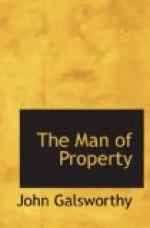“How are you, Dad?”
Old Jolyon’s hand trembled in its thin lavender glove.
“If you’re going my way,” he said, “I can give you a lift.”
And as though in the habit of taking each other home every night they went out and stepped into the cab.
To old Jolyon it seemed that his son had grown. ’More of a man altogether,’ was his comment. Over the natural amiability of that son’s face had come a rather sardonic mask, as though he had found in the circumstances of his life the necessity for armour. The features were certainly those of a Forsyte, but the expression was more the introspective look of a student or philosopher. He had no doubt been obliged to look into himself a good deal in the course of those fifteen years.
To young Jolyon the first sight of his father was undoubtedly a shock—he looked so worn and old. But in the cab he seemed hardly to have changed, still having the calm look so well remembered, still being upright and keen-eyed.
“You look well, Dad.”
“Middling,” old Jolyon answered.
He was the prey of an anxiety that he found he must put into words. Having got his son back like this, he felt he must know what was his financial position.
“Jo,” he said, “I should like to hear what sort of water you’re in. I suppose you’re in debt?”
He put it this way that his son might find it easier to confess.
Young Jolyon answered in his ironical voice:
“No! I’m not in debt!”
Old Jolyon saw that he was angry, and touched his hand. He had run a risk. It was worth it, however, and Jo had never been sulky with him. They drove on, without speaking again, to Stanhope Gate. Old Jolyon invited him in, but young Jolyon shook his head.
“June’s not here,” said his father hastily: “went of to-day on a visit. I suppose you know that she’s engaged to be married?”
“Already?” murmured young Jolyon’.
Old Jolyon stepped out, and, in paying the cab fare, for the first time in his life gave the driver a sovereign in mistake for a shilling.
Placing the coin in his mouth, the cabman whipped his horse secretly on the underneath and hurried away.
Old Jolyon turned the key softly in the lock, pushed open the door, and beckoned. His son saw him gravely hanging up his coat, with an expression on his face like that of a boy who intends to steal cherries.
The door of the dining-room was open, the gas turned low; a spirit-urn hissed on a tea-tray, and close to it a cynical looking cat had fallen asleep on the dining-table. Old Jolyon ‘shoo’d’ her off at once. The incident was a relief to his feelings; he rattled his opera hat behind the animal.
“She’s got fleas,” he said, following her out of the room. Through the door in the hall leading to the basement he called “Hssst!” several times, as though assisting the cat’s departure, till by some strange coincidence the butler appeared below.




